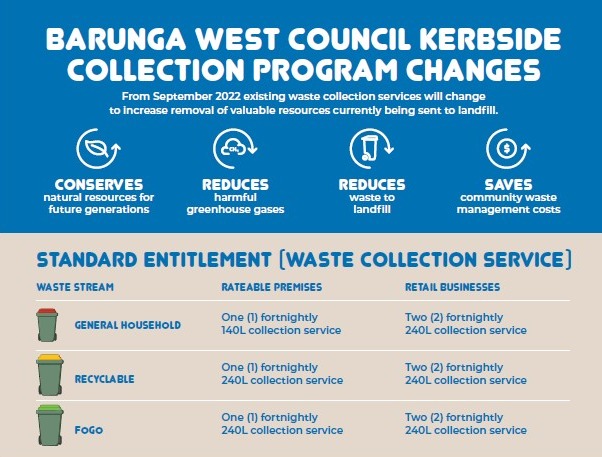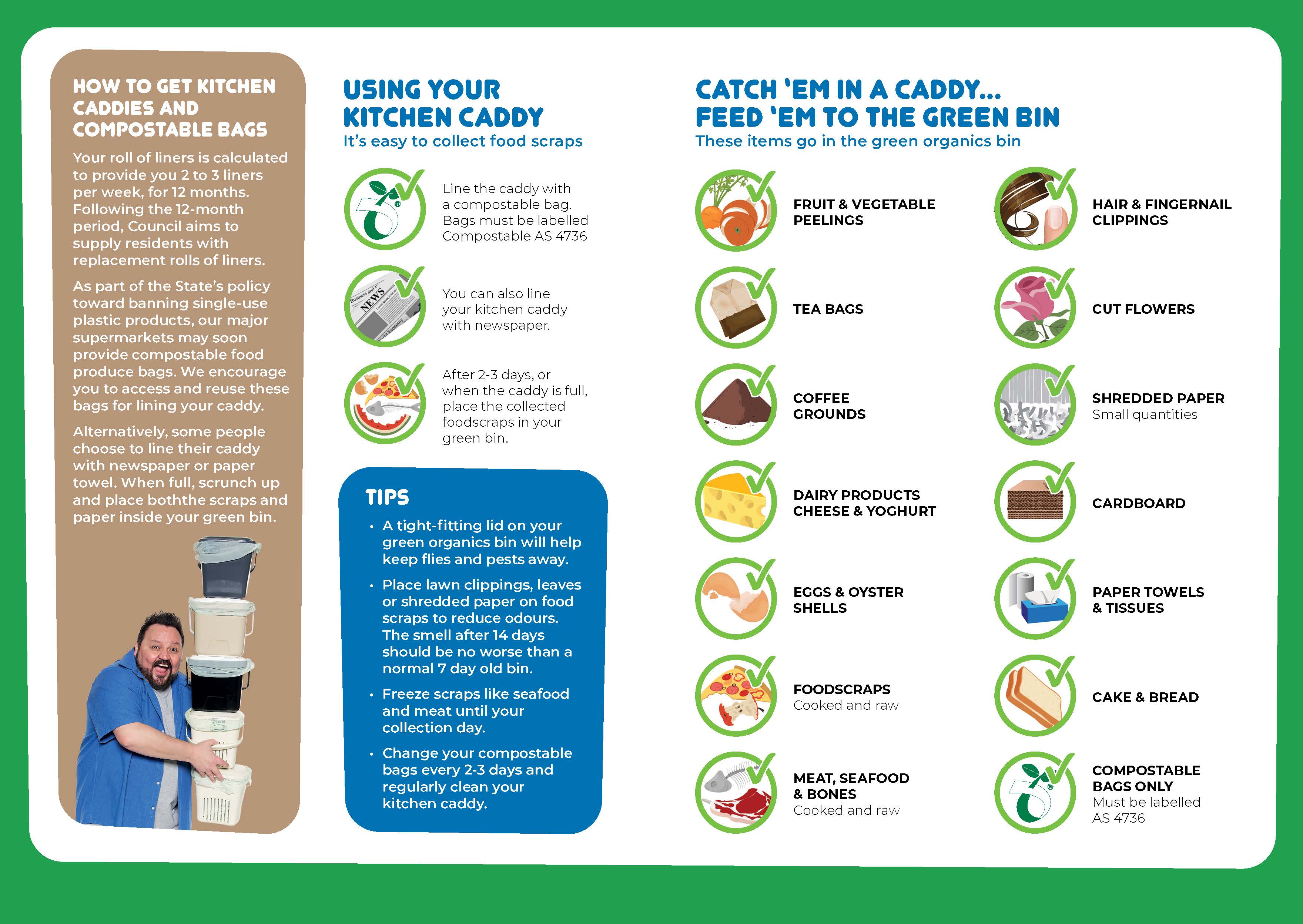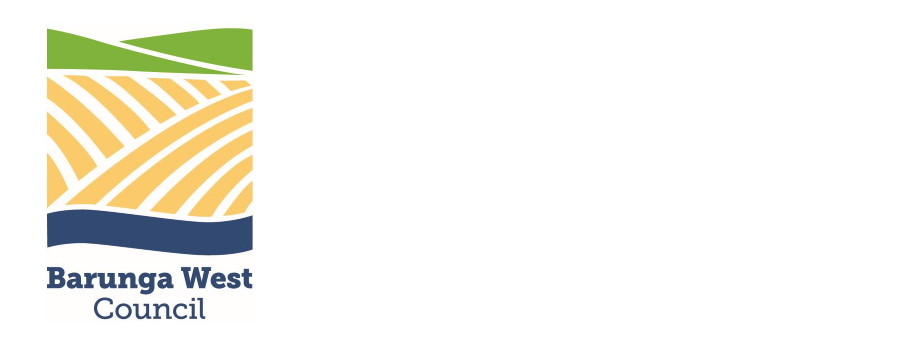Kerbside Garbage Collection

The changes will enable residents to utilise the 240l lime green bin to dispose of paper, cardboard, green organics and all food scraps. This will significantly improve the percentage of waste being diverted from landfill. The dark green paper and cardboard bin will remain the property of the resident and may be used with a new lid as the FOGO bin where households do not already have a lime green organics bin.
Council will be rolling out new bin lids to homes and businesses printed with up to date information about what materials are accepted in each bin. Residents will also be provided with an 8l vented kitchen caddy and compostable liner bags for easy collection of food waste in the home. Educational material will be developed with the assistance of Green Industries SA to be distributed to all residents during the roll out process.
For more information on standard allocations or accessing additional bins please refer to the guidelines document linked below.
Kerbside Waste Collection Guidelines
FOGO KITCHEN CADDIES

FOOD SCRAPS IN THE GREEN BIN using the kitchen caddy
Food scraps can be placed bagged or loose, directly into your green bin. Layer food scraps with grass clippings, leaves or shredded newspaper to absorb moisture and smells.
Store seafood, meat scraps and dairy in the freezer until the night before your collection to avoid unpleasant smells. Every fortnight bins full of food and garden organics materials are collected.
Your food and garden organics material is taken to a composting facility and placed into large piles. Over 8-10 weeks with the help of microbes, the right temperature and air flow, materials break down.
Once broken down, the material needs to be screened to remove contaminants such as plastic bags, irrigation pipe, glass and metal objects that have been incorrectly placed in a green bin. This is a difficult and expensive process. Finally the material is made into compost, used on South Australian farms, vineyards, glass houses and household gardens.
Almost 40% of all material in home waste bins is food scraps which release harmful greenhouse gases in landfill.
By using a kitchen caddy system you can easily divert food scraps and other compostable items from landfill and save space in your weekly red bin.

If you do not receive a Council supplied kitchen caddy, please contact us to arrange.
Kerbside Recycling Calendar
Bins must be correctly placed before 7am on collection day, preferably the night before (collection can take place any time between 7am and 5pm on the day.)
If your bin has not been emptied, check that you have followed the guidelines and whether there is an explanatory sticker on your bin before reporting the missed collection directly to Clare Valley Waste on 0438 884 340.
The truck and mechanical arm must have clear access to the bin. If the truck cannot access the bin, your garbage will not be collected.
If you would like a calendar of collection dates, please do not hesitate to contact Council on (08) 8635 2107.
If you would like general information about what you can and can't recycle, please visit. https://www.whichbin.sa.gov.au/
or for information about hazardous waste please visit http://www.greenindustries.sa.gov.au/hazwaste.
Waste Disposal Sites
The Council operates the following Waste Disposal Sites:
Port Broughton (Dale Road, Port Broughton)
Wednesday & Sundays 9:00am -12:00noon
Bute (Watson Road, Bute)
Wednesday & Sunday 2:00pm - 4:00pm
Please be advised that ALL Waste Disposal Sites will be closed on Catastrophic Total Fire Ban days.
Both sites charge a range of fees depending on quantities and efforts made to recycle as many products as possible.
Due to Asbestos Contamination of Construction Waste, NO Commercial Construction Waste will be accepted at either Bute or Port Broughton Waste Transfer Station.
Residents are still able to dispose of construction waste, however entry will be at the discretion of Council Staff.
Contaminated or Construction Waste may be disposed of at the Port Pirie Waste Transfer Station
Battery & Mobile Phone Recycling Available at Barunga West
Barunga West Council has joined with:
- Ecocycle to provide battery recycling for residents
- MobileMuster for the disposal of mobile phones.
Both the Pt Broughton and Bute Council offices now have tubes for recycling small household batteries, and a separate tube for mobile phones.
Large batteries including car batteries can be taken to both the Port Broughton and Bute Waste Transfer Stations for recycling.
Litter Control
LITTER CONTROL (LOCAL NUISANCE AND LITTER CONTROL ACT 2016)
The litter control provisions of the Local Nuisance and Litter Control Act 2016 commenced 1 February 2017.
This means that, from 1 February 2017:
- Section 235 of the Local Government Act 1999 is repealed;
- The new “tiered” littering offence provisions of the LNLC Act (which range in severity based on the type and quantity of litter) become applicable;
Expiation fees will now range the following:
- Up to 50 litres of general litter - $210
- Up to 50 litres of class B hazardous litter - $500
- 50 litres or more of class B hazardous litter or general litter - $1,000
All class A hazardous litter (asbestos) is straight to court.
For more information: http://www.lga.sa.gov.au/nuisanceandlitter
drumMUSTER programme
Council participates in the Australia-wide drumMUSTER programme for the collection of used chemical drums for recycling. This initiative provides an easy, environmentally-friendly way of disposing of empty farming chemical containers across rural Australia.
drumMUSTER collects eligible non-returnable metal or plastic containers above one litre/kilogram and up to 205 litre/kilogram in declared content in the packaging of crop production and animal health products used for:
*agricultural and livestock production
*industrial and recreational pest and weed control
*forestry
*household pest control operations
*similar activities conducted by government authorities.
Participating manufacturers are identified by the inclusion of the eligible drumMUSTER container logo on their eligible containers. The logo can be displayed on the chemical label, embossed into the container wall or applied as a sticker to the container. Containers not displaying this logo may be from non-participating manufacturers and will not be accepted into the program.

Rinse them out, round them up and run them in.
drum MUSTER is the national program for the collection and recycling of empty, cleaned, non-returnable metal and plastic agvet chemical containers.
Bookings to dispose of chemical containers through Council’s drumMuster can be made through Council on 8635 2107.
Locations are the Bute Waste Transfer Station and Port Broughton Waste Transfer Station.
An agreed time will be made with trained Council staff.
CONTAINERS CANNOT BE DROPPED OFF AT WASTE TRANSFER STATIONS WITH NO PRIOR BOOKING.
For drums to be eligible for collection they must be:
*Free of chemical residue (some stains may be accepted)
*Be clean, dry and have lids removed
*Containers carrying the drumMUSTER logo only, will be accepted.
Before acceptance, drums will be examined by drumMUSTER inspectors and, if not totally cleaned as required, they will be rejected.
For more information visit www.drummuster.com.au
